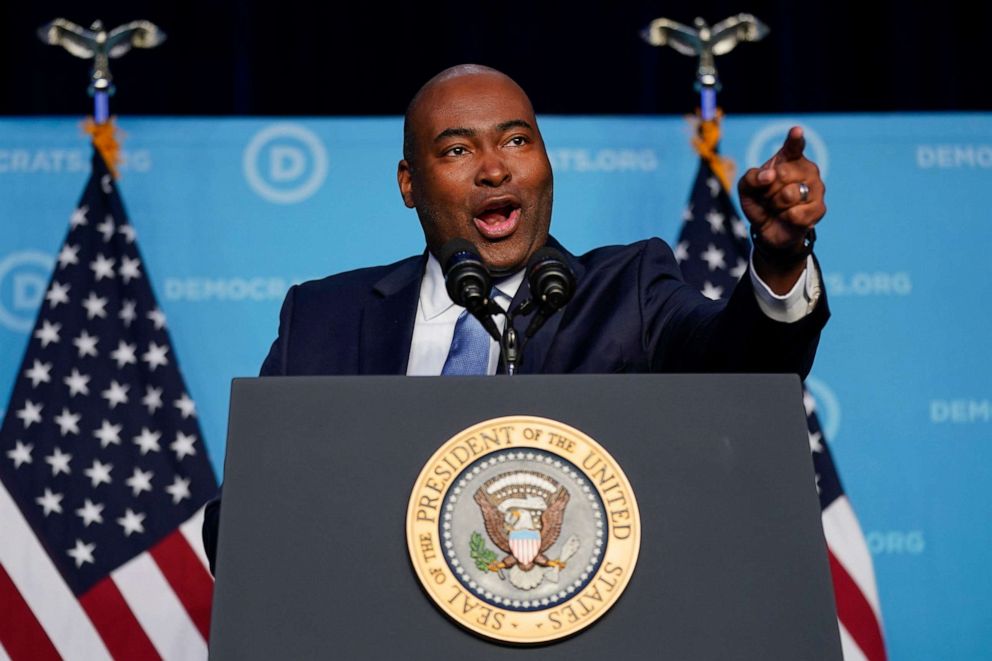Tough questions ahead for Ketanji Brown Jackson at SCOTUS hearings: The Note
"Respectful and dignified" could be easier said than done.
The TAKE with Averi Harper
Monday will mark the beginning of hearings for the historic Supreme Court nomination of Judge Ketanji Brown Jackson.
Jackson has been confirmed by the Senate three times, and this time around Democrats don't need Republican buy-in to complete her ascent to the nation's highest court. They only need a simple majority to confirm Jackson, and if Democrats are unified in this 50-50 Senate, Vice President Kamala Harris could serve as the tie-breaking vote if needed.

That slim Democratic majority, however, won't shield Jackson from tough lines of questioning on matters pertaining to her personal affiliations, like her ties to Harvard as the court prepares to hear a case challenging the university's use of race as a factor in undergraduate admissions, and her past professional experiences, including representing Guantanamo Bay detainees.
Senate Judiciary Committee Chair Sen. Dick Durbin has called for "respectful and dignified hearings" on Jackson, but that could be easier said than done.
With several Republican committee members who could launch presidential bids in 2024, including Sens. Ted Cruz, Josh Hawley and Tom Cotton, there is plenty of potential for hearings to devolve into political theater.
The RUNDOWN with Alisa Wiersema
On the heels of Ukrainian President Zelenskyy's emotional virtual address to Congress, on Thursday the House passed a bill ending normal trade relations with Russia and its ally, Belarus. The vote signaled the latest attempt by the U.S. government to crush Russia's economy amid the Kremlin's catastrophic invasion of Ukraine.
In an overwhelming bipartisan move, the bill passed 424-8. The eight lawmakers in opposition were Republicans.
The measure must still pass in the Senate before heading to President Joe Biden's desk for signature. If enacted, the legislation would allow the United States to raise tariffs on Russian and Belarusian products. Existing measures to punish Russia include bans on Russian oil and gas, as well as more than $13 billion in humanitarian and military aid to Ukraine.

The move comes after Biden announced last week that the U.S., along with NATO allies, would revoke Russia's "most favored nation" trade status. Countries with that status agree to trade fairly with one another, though the designation is largely symbolic.
The development helps build geopolitical momentum ahead of Biden's trip to Belgium next week, where he will attend the NATO leaders' summit. As stated by White House press secretary Jen Psaki, there the leaders will discuss "ongoing deterrence and defense efforts in response to Russia's unprovoked and unjustified attack on Ukraine."
The TIP with Brittany Shepherd
Democrats have an appetite for big change in national party tradition -- and Iowa may be next on the menu. Yesterday, New Jersey Democratic Party Chair LeRoy J. Jones Jr. wrote to Democratic National Committee Chair Jamie Harrison and pitched New Jersey for consideration as an early primary state that holds its presidential primary before Super Tuesday, ABC News has learned.
Jones claims Jersey boasts a more cost-effective alternative for candidates and offers a diverse racial and geographical population more representative of the national party.

"Our party cannot cling to outdated traditions that do not help us reach new voters and motivate the diverse coalition of supporters needed to win elections and enact our pro-middle class agenda," Jones Jr. writes.
Democrats have allowed changes to the early state calendar before, and challenges to the status quo -- plus desires to unseat Iowa, the first-in-the-nation caucus that ceremoniously unraveled at the start of the 2020 presidential contest -- have never been stronger.
The DNC is now considering altering which states get early primary status, reportedly open to expanding the group from four to five and imposing new guidelines that would make it difficult for Iowa, a state with historic precedent but with waning relevance to the demographic makeup of the Democratic Party, to maintain its fabled placement.
NUMBER OF THE DAY, powered by FiveThirtyEight
35. That's the percentage of Americans who want to keep resetting their clocks every fall and spring. In other words, the Senate's recently passed bill that would make daylight saving time permanent might be pretty popular. Only, as FiveThirtyEight's Amelia Thomson-DeVeaux writes, it's not clear whether Americans would actually like permanent daylight saving time if they got it. Because while longer afternoons and a consistent schedule are appealing, there's a tradeoff that many Americans don't like -- dark winter mornings.
THE PLAYLIST
ABC News' "Start Here" Podcast. Start Here begins on Friday with an update on the COVID pandemic with Dr. Anthony Fauci. He explains what to expect as a new variant surges. And, ABC's Martha Raddatz reports on China's potential involvement in the Ukraine conflict. http://apple.co/2HPocUL
WHAT YOU NEED TO KNOW TODAY
Download the ABC News app and select "The Note" as an item of interest to receive the day's sharpest political analysis.
The Note is a daily ABC News feature that highlights the day's top stories in politics. Please check back Monday for the latest.




